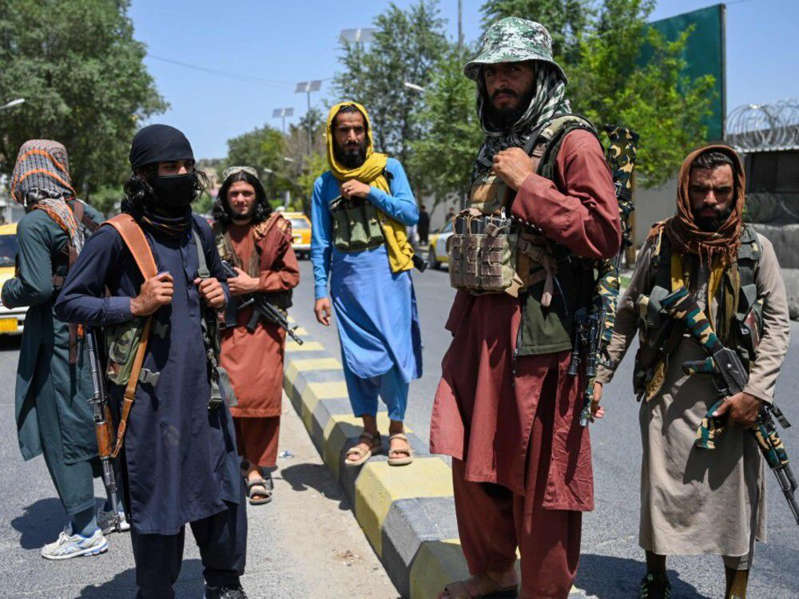
© Provided by National Post Taliban fighters stand guard along a street near the Zanbaq Square in Kabul on August 16, 2021.
Video player from: YouTube (Privacy Policy, Terms)
It seems incredible that a single week can tear the fate of a nation into a Before and After.
Last Saturday night, my city was holding its breath. We checked the locks on our windows and doors. We bent over hushed television and phone screens. We stayed alert for the sounds of gunfire, motorbike horns and grenades — and we prayed.
Mazar-e-Sharif is Afghanistan’s fourth-largest city and a site of strategic importance, “the northern stronghold.” Only three days before, on the Wednesday, President Ashraf Ghani was flying into my city for clandestine meetings with our government officials and media agencies.
On Saturday evening as we waited, government security forces and pro-government militias amassed on the approaches to the city. The calm — the limbo of waiting — was eerie.
By 7:30 p.m., the triumphant roar of Taliban motorbikes was heard. Our hearts broke. By 8 p.m., the Afghan tricolour flag was being lowered in the white glare of the victors’ headlamps, and the haunting white-and-black banner of the Taliban was hoisted by a stocky fighter in Taliban garb: a white flag for “purity,” with black Arabic script. It reads, “I bear witness that none deserves worship except God, and I bear witness that Muhammad is the messenger of God.”
- Terry Glavin: Afghan leadership retreats with special forces in defiance of the Taliban
- Colby Cosh: Afghanistan’s fall to the Taliban should revive the Powell Doctrine of clear military goals
We know the history. My parents lived it in the late ’90s. What, I wondered, on Saturday night, do the Taliban know of God or Islam?
No bullet was fired. Confronted with a legendary enemy, the national security forces — a fraction of the size suggested by official figures — lost faith in the resolve and strategy of our president and leaders. Was there any strategy? Had the Western forces helped to develop one? No one knows. We know only that there was no evidence of it.
Some of our soldiers lacked pay, food and proper uniforms. They no longer had the fundamental back-up of Allied air cover. With the fall of Mazar-e-Sharif, the North was lost in a night. Trouble was born, alive and kicking. Our dreams died.
Later, Jalalabad fell, then, on Sunday, Kabul. As the world now knows, Ghani fled to the UAE, allegedly with $169 million from the government coffers. Over the last week, Afghans have united to post, on social media, one message for Interpol: #arrestGhani.
On Monday morning, the new reality, if surreal, was undeniable. The borders had closed. I did not reach for my usual chinos, T-shirt and ball cap. I changed into traditional dress. As I drove into the city centre, I stopped for gas. “Brother, pay 10 Afghanis more. The price of fuel has increased.” Banks stayed closed. Shops too. Shopkeepers sat outside their properties, wary but bristling and holding their ground.

© Supplied to National Post The streets of Mazar-e-Sharif are empty after the Taliban takeover. Women and girls stay inside their houses.
Everyone is impatient to withdraw from the banks any savings they are lucky to have. Many families confer in desperation, trying to make get-away plans. Millions won’t make it.
Our streets are still strangely empty, except for the heavily armed Taliban patrols. Occasionally, they pose for pictures, proud of their long beards, their Kalashnikovs and rocket-propelled grenade launchers.
Small boys, who wander out of doors for air and sunshine, stare at the Taliban soldiers, dazed and fascinated. Many of these fighters are young men who were not yet born when the Taliban last ruled Afghanistan, from 1996 to 2001. They are men who have no experience of the brutalized and traumatized nation of that time.
Teachers and government officials in my city have learned that they will not be paid, not in the short term at least. The government’s coffers are almost empty, and the loss of UN funding is widely feared.
Meanwhile, inflation soars. With the border closures, food and supplies have been increasingly scarce. Even our local conquerors struggle. Today, I saw one Taliban soldier who had 20 Afghani in his hand. He was at a baker’s, wanting to buy something to eat. The baker said to him, “That sum will buy you nothing but dry bread.” The young fighter begged. He told the baker he and his fellow soldiers have no pay, no money. “I haven’t eaten anything in two days and two nights.”
I might tell myself that the Taliban are not human — we know what they are capable of. Still, I felt sorry for him.
Little wonder then that municipal Taliban officials have knocked on our doors and ordered us, the local people, to provide its men with three meals a day. We are to organize it, cook it and pay for it, when we struggle to feed ourselves or afford the passports we need, to have any hope of a way out. The price of flour alone has risen from 1,450 to 2,200 Afghani.
The almost unspeakable fear is for girls and women. Many Afghans have been sharing word of an uncorroborated Taliban announcement: Taliban workers will soon go door-to-door to collect the names of all girls and women between the ages of 12 and 42. They will be “married” to Taliban fighters. Women are the “gifts of holy war.” We must say it as it is: if this happens, they will be abducted from their homes and raped.
The specificity of the report has been unnerving — because it has the ring of truth. A friend in Herat, Farmosh phoned me when she first heard it, terrified. It was not easy to be a voice of calm on the other end. What reassurance could I actually — honestly — offer? I could only try.
Rumours, reports, informal announcements and orders swirl. As I walked the streets of my city, I listened to an old man’s alleged eyewitness report of the abduction of women in his district. Was it true? Was it not? I didn’t know. Even so, I was terrified for my 20-year-old sister. The old man was shaking as he spoke.

© Supplied to the National Post Only men patrol the streets as Afghan women and girls, terrified for their fate, remain hidden in their homes.
So, girls and women are captive — literally — to our fears. My sister and mother have not left the house all week. At my local mosque this week, the Taliban were denounced by the Mullah, while the education and careers of women were championed.
We simply do not know what to expect. Ambiguity is a powerful — perhaps the most powerful — Taliban weapon this week. Uncertainty fuels dread like nothing else.
While soap operas still air, music videos have been removed from our television channels. Too sexy, too revealing. A show called “Afghan Star” — a version of “American Idol” — has been cut by Tolo TV. Afghan broadcasters are being told “informally” that female presenters and anchors must dress “acceptably.” Self-censorship is the new pragmatism.
While the world listens, media people and journalists are reassured that the press will remain free as long as its professionals do nothing “un-Islamic”; as long as no reporting is “against national interests” or “the spirit of Islam.” Meaning will be made and re-made in the image of the Taliban.
As I write this, there are reports today of Afghan local reporters, much like myself, being beaten up. Journalists’ houses are being raided. Today we learn that a Deutsche Welle reporter was hunted down; that a member of his family was murdered. It is of course a message for us all.

© Supplied to the National Post The Taliban raise the flag on Mazar-e-Sharif.
My family and I try to arrange our passports; we stay alert to every visa opportunity. Above all, we fear for my sister. I also fear that my work might make my family a target. Even these words are hard to write; to see them in black and white.
The official face of retribution and monitoring is the Taliban’s new Media Commission, which has already been established; so too, a Culture & Religion Commission. But neither means anything without the teeth of the new Taliban Court, also in formation.
If we were to imagine that the long-haired, unkempt, hungry fighters of our street patrols are representative of the Taliban’s mission, we’d be mistaken. It is a highly organized force. As a people, as Afghanistan, we understand what their mission will be.
Part One: secure and systematize power, in part by “winning hearts and minds” of Afghans for the new dictatorship. Some report that the Taliban are already catching petty criminals and enforcing calm on our streets. Is an “enforced calm” a contradiction? I keep such questions to myself. Among strangers, one cannot know who will be colluding with the new regime, who will be listening.
Part Two: a transitional period, perhaps of a few years. The Taliban will want international support for trade and finance. Its energies will be dedicated to its global profile. It knows the world will be watching. The new government will project an image of “Sharia-Lite.” It will say one thing and do another.
Part Three: the establishment of the new Emirate. Our Taliban government will no longer need to rule with ambiguity and insinuation. It will rule by decree.
As a journalist, I am in the business of truth-telling. But suddenly, I don’t know where or how to begin.
Sayed Ahmad Sadat is an Afghan freelance journalist with the Khaama Press News Agency and Subh-e-Kabul News Daily. He has also written for “Human Stories.”








